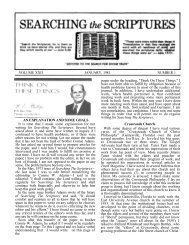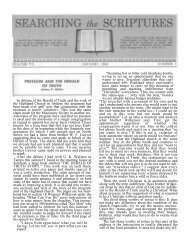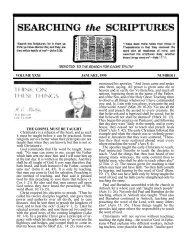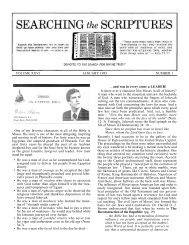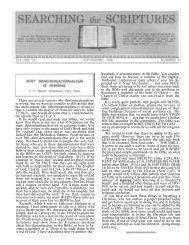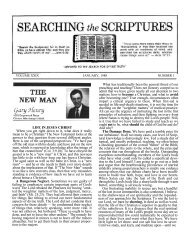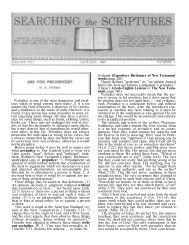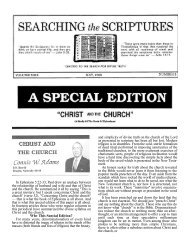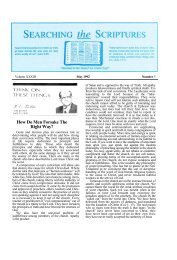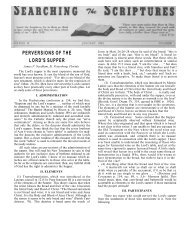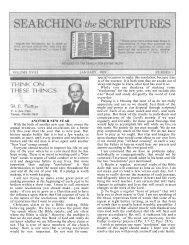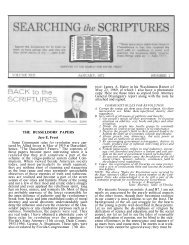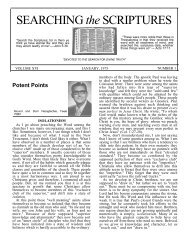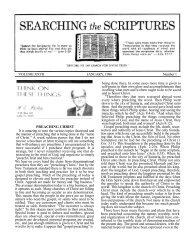Volume 21 – 1980 (PDF) - Searching The Scriptures
Volume 21 – 1980 (PDF) - Searching The Scriptures
Volume 21 – 1980 (PDF) - Searching The Scriptures
You also want an ePaper? Increase the reach of your titles
YUMPU automatically turns print PDFs into web optimized ePapers that Google loves.
Page 8<br />
Betty Friedan and other feminists announced several<br />
months ago a seminar in 1979 to be called: A<br />
National Assembly on the Future of the Family. Ms.<br />
Friedan says it will mark 'Phase 2 of the human<br />
liberation movement.' What is a family? Ms. Friedan<br />
says: 'Family is people who are living together with<br />
deep commitment and with mutual needs and<br />
sharing.' She speaks of 'new forms emerging' (News<br />
and Observor, Raleigh, N.D., 2-18-79).<br />
"According to this definition, a family could be a<br />
homosexual couple, a commune, or professional<br />
parents and child care centers.<br />
"In the planning draft of the National IYC<br />
Commission, they affirm: '<strong>The</strong> right to a family, not<br />
necessarily society's traditional view of a family, but<br />
any unit that needs specific support from societal<br />
institutions and agencies, both formal and informal.'<br />
"So, under the guise of 'strengthening the family'<br />
the traditional family is to be destroyed—and any<br />
kind of living arrangement is to be considered just as<br />
valid and desirable. Of course, this would pave the<br />
way for all legislation involving 'gay rights,'<br />
federally-controlled child development centers, etc.,<br />
and the goal is not only legal acceptance but social<br />
acceptance of the 'emerging new family forms.' "<br />
Brethren, let us not be deluded by the philosophy<br />
that Christians should not be concerned with such<br />
"political" issues. <strong>The</strong>se matters are moral issues<br />
with very definite spiritual undertones. Because some<br />
ungodly government leaders and libertarians make<br />
them political issues does not change their basic<br />
moral nature.<br />
Let us "have no fellowship with the unfruitful<br />
works of darkness, but rather reprove them" (Eph.<br />
5:11).<br />
-———— O-———<br />
HOW MUCH IS ONE PERSON WORTH?<br />
As I write this, our country is in the midst of the<br />
Iranian crisis. Hopefully, by the time you read this,<br />
that crisis will have been resolved in a good way.<br />
One thought-provoking sidelight has been the offer<br />
of a couple of well known names to trade places with<br />
the 53 hostages now being held. Muhammad Ali,<br />
retired heavyweight boxing champion, and James<br />
Earl Ray, convicted assassin of Martin Luther King,<br />
have both offered themselves in exchange for those<br />
captives.<br />
That's mighty big of them. Without trying to<br />
ponder motives, sincerity, etc., one wonders why Ali<br />
and Ray would think themselves worthy substitutes<br />
for 53 persons. <strong>The</strong>ir gestures may have been<br />
considered had they offered themselves in trade for<br />
one hostage each.<br />
How much is a person worth? Various estimates<br />
are offered as to the material value of the physical<br />
body. As for the soul of man, it is worth more than<br />
all the material world together (Matt. 16:26). But one<br />
thing for sure. One soul is worth no more than<br />
another: "<strong>The</strong>y that trust in their wealth, and boast<br />
themselves in the multitude of their riches; None of<br />
them can by any means redeem his brother, nor give<br />
to God a ransom for him: (For the redemption of<br />
their soul is precious, and it ceaseth forever:) That he<br />
should still live forever, and not see corruption"<br />
(Psalm 49:6-9).<br />
<strong>The</strong>re's but one exception. It involves "God<br />
manifest in the flesh." He "gave himself a ransom for<br />
all" (1 Tim. 2:6). Should one ask how He could<br />
possibly substitute for all other people, the answer is<br />
simple. He is worth more than all other people.<br />
"For by him were all things created, that are in<br />
heaven, and that are in earth, visible and invisible,<br />
whether they be thrones, or dominions, or<br />
principalities, or powers: all things were created by<br />
him, and for him: and he is before all things, and by<br />
him all things consist" (Col. 1:16, 17).<br />
---------------o----------------<br />
ABOUT THE EVANGELICAL'S PATRON<br />
SAINT<br />
Clive Staples Lewis has posthumously wielded<br />
quite an influence in these recent times. <strong>The</strong> above<br />
title will not be seriously questioned by readers of<br />
such evangelical organs as Christianity Today or<br />
Eternity. Some young gospel preachers have been<br />
turned on to Lewis to the extent that their writings<br />
sound just like him. One such young man of<br />
exceptional talent has expressed the fearful<br />
prediction that it will soon become popular to criticize<br />
Lewis.<br />
Let me say that I have been a C. S. Lewis reader<br />
for years. I have benefited greatly from such books<br />
of popular theology as Miracles, <strong>The</strong> Problem of<br />
Pain, and Mere Christianity, the last of which I've<br />
read four times. Other books and essays have proved<br />
helpful or entertaining, usually both. I've read<br />
through the seven volumes of Chronicles of Narnia<br />
twice with my children, and look forward to the third<br />
journey through those remarkable adventures as soon<br />
as my three-year-old is ready. At this time, Lewis'<br />
space trilogy is being enjoyed by Daddy and the two<br />
middle kids at the Green house.<br />
But people need to keep their heads about mortals.<br />
Let us give credit where it is due, but remain aware<br />
of a teacher's faults where they exist. Dr. Raymond<br />
F. Swiburg, professor of biblical hermeneutics and<br />
Old Testament interpretation at Concordia Seminary<br />
in Fort Wayne, Ind., documented, in the Oct. 8,<br />
1979, issue of <strong>The</strong> Christian News (an evangelical<br />
Lutheran magazine) some of the doctrines that C. S.<br />
Lewis espoused.<br />
Lewis rejected Biblical inerrancy. He taught that<br />
God used many forms of inspiration outside the<br />
Bible, including pagan myths. He believed in theistic<br />
evolution. He taught that the Genesis account of<br />
man's fall was a myth. He believed that some<br />
animals might have immortal souls. He had a false<br />
understanding of Christ's atonement, accepting the<br />
"example theory". He taught that pagans ("people in<br />
other religions . . .") may "belong to Christ without<br />
knowing it." Lewis believed in purgatory and praying<br />
for and to the dead.<br />
C. S. Lewis was a brilliant thinker and writer. His<br />
Mere Christianity will equip one to meet atheistic<br />
arguments as well as any book I know. But let us<br />
learn "not to think of men above that which is<br />
written" (1 Cor. 4:6).



